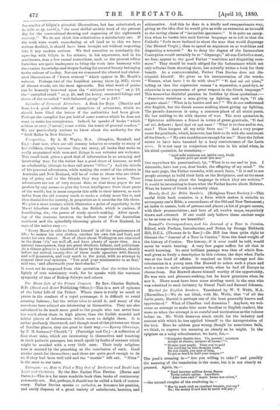Eutropia : or, How to Find a Way Out of
Darkness and Doubt into Light and Certainty By the Rev. Father Pius Devine. (Barns and Oates.)—This is a far more readable book than books of controversy commonly are. But, perhaps, it should not be called a book of contro- versy. Father Devine speaks es cathedra, as becomes his position, and easily disposes of a great variety of unbelievers, heretics, and schismatics. And this he does in a kindly and compassionate way, giving us the idea that he would give as wide an extension as he could to the saving clause of "invincible ignorance." It is quite an excep- tion when he bursts into such fervent language as to tell US that the Catholic "feels more inclined to shoot the man that would disparage' [the Blessed Virgin], than to spend an argument on so worthless and disgusting a monster." As to deny the dogma of the Immaculate Conception would certainly be to "disparage," all non-Catholics must, we fear, appear to the good Father "worthless and disgusting mon- sters." They should be much obliged for the forbearance which not only refrains from shooting them, bat' actuallywrites a book for their benefit. As a controversialist, Father Pius Devine does not din. tinguish himself. He gives us his interpretation of the words, "Woman, what have I to do with thee ?" "Ti 4.4o1 cal cml 71;sal," telling us that the expression means "a separation, a good-bye, or otherwise is an expression of great respect in the Greek language." This somewhat doubtful position he fortifies by these quotations :— " Anacreon mentions a man giving up fighting, and says, yap tiaxaio-t Kiyhoi:"What is to battles and me ?" We do not understand this English, but the Greek means nothing about giving up fighting.. The pseudo-Anacreon is using a common-place of all erotic poets.. He has nothing to do with themes of war. The next quotation is, " Epictetus addresses a friend in terms of great gratitude, 'Ti 4uoL Kal aul, gvflpanrs ; *el elhoi Ta esh =Ka :2 What is to thee and to me, man ? Thou keepest all my evils from me.'" And a very proper cause for gratitude, which, however, has little to do with the sentiment of the Greek,—" My own troubles are enough for me." Here the father seems to have been haunted by a hazy reminiscence of the Latin arceo. It is not easy to conjecture what was in his mind when, in his third quotation, he translates,— " Quid mihi yobiscmn est, infelix cum, libelli Ingenio peril qui miser ipso awe."
(we reproduce his punctuation), by, "What is to me and to 'you. I miserable, have lost you, dear books, the offspring of my mind." On, the next page, the Father remarks, with much force, "It is sad to see people attempt to build their faith on the Scriptures, and at the same time know nothing about the language in which they are written." It would be interesting to learn what the Father knows about Hebrew. What he knows of Greek is tolerably clear.


































 Previous page
Previous page